Related Research Articles
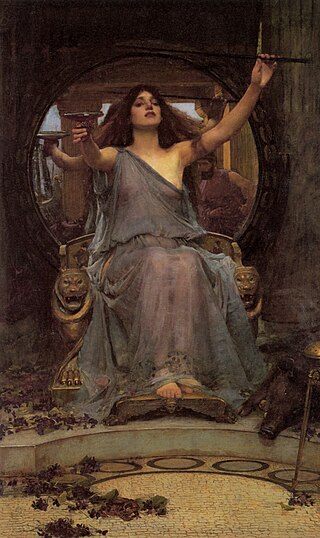
Circe is an enchantress and a minor goddess in ancient Greek mythology and religion. In most accounts, Circe is described as the daughter of the sun god Helios and the Oceanid nymph Perse. Circe was renowned for her vast knowledge of potions and herbs. Through the use of these and a magic wand or staff, she would transform her enemies, or those who offended her, into animals.
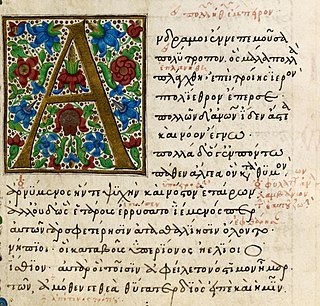
The Odyssey is one of two major ancient Greek epic poems attributed to Homer. It is one of the oldest extant works of literature still widely read by modern audiences. As with the Iliad, the poem is divided into 24 books. It follows the Greek hero Odysseus, king of Ithaca, and his journey home after the Trojan War. After the war, which lasted ten years, his journey from Troy to Ithaca, via Africa and southern Europe, lasted for ten additional years during which time he encountered many perils and all of his crewmates were killed. In his absence, Odysseus was assumed dead, and his wife Penelope and son Telemachus had to contend with a group of unruly suitors who were competing for Penelope's hand in marriage.
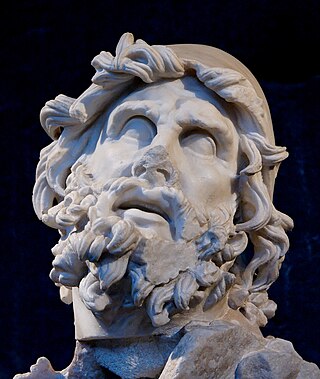
In Greek and Roman mythology, Odysseus, also known by the Latin variant Ulysses, is a legendary Greek king of Ithaca and the hero of Homer's epic poem the Odyssey. Odysseus also plays a key role in Homer's Iliad and other works in that same epic cycle.

The Trojan War was a legendary conflict in Greek mythology that took place around the 12th or 13th century BCE. The war was waged by the Achaeans (Greeks) against the city of Troy after Paris of Troy took Helen from her husband Menelaus, king of Sparta. The war is one of the most important events in Greek mythology, and it has been narrated through many works of Greek literature, most notably Homer's Iliad. The core of the Iliad describes a period of four days and two nights in the tenth year of the decade-long siege of Troy; the Odyssey describes the journey home of Odysseus, one of the war's heroes. Other parts of the war are described in a cycle of epic poems, which have survived through fragments. Episodes from the war provided material for Greek tragedy and other works of Greek literature, and for Roman poets including Virgil and Ovid.

In Greek mythology, Menelaus was a Greek king of Mycenaean (pre-Dorian) Sparta. According to the Iliad, the Trojan war began as a result of Menelaus’s wife, Helen, fleeing to Troy with the Trojan prince Paris. The cuckolded Menelaus was a central figure in the Trojan War, leading the Spartan contingent of the Greek army, under his elder brother Agamemnon, king of Mycenae. Prominent in both the Iliad and Odyssey, Menelaus was also popular in Greek vase painting and Greek tragedy, the latter more as a hero of the Trojan War than as a member of the doomed House of Atreus.

Penelope is a character in Homer's Odyssey. She was the queen of Ithaca and was the daughter of Spartan king Icarius and Asterodia. Penelope is known for her fidelity to her husband Odysseus, despite the attention of more than a hundred suitors during his absence. In one source, Penelope's original name was Arnacia or Arnaea.

Telemachus, in Greek mythology, is the son of Odysseus and Penelope, who is a central character in Homer's Odyssey. When Telemachus reached manhood, he visited Pylos and Sparta in search of his wandering father. On his return to Ithaca, he found that Odysseus had reached home before him. Then father and son slew the suitors who had gathered around Penelope. According to later tradition, Telemachus married Circe after Odysseus’ death.
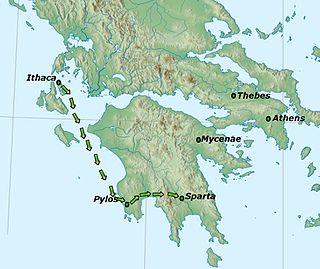
The Telemachy is a term traditionally applied to the first four books of Homer's epic poem the Odyssey. They are named so because, just as the Odyssey tells the story of Odysseus, they tell the story of Odysseus's son Telemachus as he journeys from home for the first time in search of news about his missing father.

A Sea Symphony is an hour-long work for soprano, baritone, chorus and large orchestra written by Ralph Vaughan Williams between 1903 and 1909. The first and longest of his nine symphonies, it was first performed at the Leeds Festival in 1910 with the composer conducting, and its maturity belies the relatively young age – 30 – when he began sketching it. Moreover it is one of the first symphonies in which a chorus is used throughout as an integral part of the texture and it helped set the stage for a new era of symphonic and choral music in Britain during the first half of the 20th century. It was never numbered.
The Telegony is a lost ancient Greek epic poem about Telegonus, son of Odysseus by Circe. His name is indicative of his birth on Aeaea, far from Odysseus' home of Ithaca. It was part of the Epic Cycle of poems that recounted the myths of the Trojan War as well as the events that led up to and followed it. The story of the Telegony comes chronologically after that of the Odyssey and is the final episode in the Epic Cycle. The poem was sometimes attributed in antiquity to Cinaethon of Sparta, but in one source it is said to have been stolen from Musaeus by Eugamon or Eugammon of Cyrene. The poem comprised two books of verse in dactylic hexameter.
In the Epic Cycle, Antinous or Antinoös, was the Ithacan son of Eupeithes, best known for his role in Homer's Odyssey.
Ralph Vaughan Williams's Symphony No. 3, published as Pastoral Symphony and not numbered until later, was completed in 1922. Vaughan Williams's initial inspiration to write this symphony came during World War I after hearing a bugler practising and accidentally playing an interval of a seventh instead of an octave; this ultimately led to the trumpet cadenza in the second movement.

The Penelopiad is a novella by Canadian author Margaret Atwood. It was published in 2005 as part of the first set of books in the Canongate Myth Series where contemporary authors rewrite ancient myths. In The Penelopiad, Penelope reminisces on the events of the Odyssey, life in Hades, Odysseus, Helen of Troy, and her relationships with her parents. A Greek chorus of the twelve maids, who Odysseus believed were disloyal and whom Telemachus hanged, interrupt Penelope's narrative to express their view on events. The maids' interludes use a new genre each time, including a jump-rope rhyme, a lament, an idyll, a ballad, a lecture, a court trial and several types of songs.

The Returns from Troy are the stories of how the Greek leaders returned after their victory in the Trojan War. Many Achaean heroes did not return to their homes, but died or founded colonies outside the Greek mainland. The most famous returns are those of Odysseus, whose wanderings are narrated in the Odyssey, and Agamemnon, whose murder at the hands of his wife Clytemnestra was portrayed in Greek tragedy.
The Second Suite in F for Military Band is Gustav Holst's second of his two suites for concert band. Although performed less frequently than the First Suite in E♭, it is still a staple of the band repertoire. The Second Suite, written in 1911 and first published in 1922, dedicated to James Causley Windram, is longer and considered more difficult to play than its sister suite.
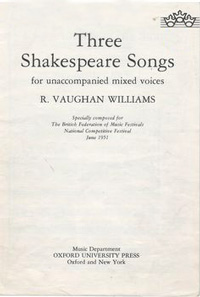
Three Shakespeare Songs is a piece of classical choral music written for an a cappella SATB choir. It was written in 1951 by the British classical composer Ralph Vaughan Williams. The work comprises three short pieces which are settings of text from two plays by the English playwright William Shakespeare. It is published by Oxford University Press.
Melanthius, the son of Dolius, is a minor, yet important character in Homer's Odyssey: Odysseus's disloyal goatherd. In contrast, Odysseus's cowherd Philoetius and swineherd Eumaeus have both remained loyal to Odysseus during his twenty years of wanderings, as have Melanthius's father and six brothers.
In music, a cross-beat or cross-rhythm is a specific form of polyrhythm. The term cross rhythm was introduced in 1934 by the musicologist Arthur Morris Jones (1889–1980). It refers to a situation where the rhythmic conflict found in polyrhythms is the basis of an entire musical piece.
In Greek mythology, Melantho is one of the minor characters in the Odyssey.
References
- ↑ Vaughan Williams Collected Songs in Three Volumes: Vol. 1 Oxford University Press, Great Britain. 1993.
- 1 2 3 4 Adams, Byron and Robin Wells, eds. Vaughan Williams Essays Ashgate Publishing, Ltd, 2003. pp. 157–171.
- ↑ 'Ralph Vaughan Williams', Grove Music Online (subscription required) Archived 16 May 2008 at the Wayback Machine ed. L. Macy (Accessed 12 February 2008),
- ↑ "Vaughan Williams/Payne: Four Last Songs". anthonypayne.org.uk. Retrieved 17 July 2021.